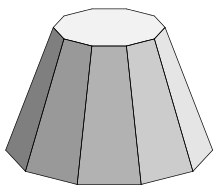frustum
English

A frustum of a decagonal pyramid
Pronunciation
Audio (US) (file)
Noun
frustum (plural frustums or frusta)
- A cone or pyramid whose tip has been truncated by a plane parallel to its base.
- 1742, Colin MacLaurin, A Treatise of Fluxions, Volume 1, page 25,
- In a parabolic conoid this difference vaniſhes, the fruſtum being always equal to a cylinder of the ſame height upon the ſection of the conoid that biſects the altitude of the fruſtum and is parallel to its baſes.
- 1809, Frustum, entry in William Nicholson, The British Encyclopedia, Volume 3, unnumbered page,
- This theorem holds good for complete solids as well as frustums, whether right or oblique […] .
- 2006, Pawan Harish Nirnimesh, P. J. Narayanan, Culling an Object Hierarchy to a Frustum Hierarchy, Prem Kalra, Shmuel Peleg (editors), Computer Vision, Graphics and Image Processing: 5th Indian Conference, ICVGIP 2006, Springer, LNCS4338, page 252,
- However, when there are multiple view frustums (as in a tiled display wall), visibility culling time becomes substantial and cannot be hidden by pipelining it with other stages of rendering.
- 2008, R. Benjamin Davis, Techniques to Assess Acoustic-structure Interaction in Liquid Rocket Engines, page 122,
- Here, the dynamics of the fluid-filled frusta of cones are considered (see Figure 5.5). The frusta are clamped at their roots and free at their ends.
- 1742, Colin MacLaurin, A Treatise of Fluxions, Volume 1, page 25,
- A portion of a sphere delimited by two parallel planes.
- 1840, James Blundell, Observations on Some of the More Important Diseases of Women, page 131,
- In some women it[the os uteri] is flat, in many more tuberose, and forming, as it were, a frustum of a sphere; […] .
- 2014, John Bird, Engineering Mathematics, page 183,
- Problem 22. Determine the volume of a frustum of a sphere of diameter 49.74 cm if the diameter[sic] of the ends of the frustum are 24.0 and 40.0 cm, and the height of the frustum is 7.00 cm.
- 1840, James Blundell, Observations on Some of the More Important Diseases of Women, page 131,
Usage notes
The misspelling frustrum is by incorrect analogy with frustrate, also of Latin origin.[1]
Derived terms
- bifrustum
- frustum culling
- view frustum
- viewing frustum
Related terms
Translations
truncated cone or pyramid
|
Latin
Etymology
From Proto-Italic *frustom, from Proto-Indo-European *bʰrus-tós, from *bʰrews- (“to break up, cut”).
Pronunciation
- (Classical) IPA(key): /ˈfrus.tum/, [ˈfrʊs.tũ]
Inflection
Second declension.
| Case | Singular | Plural |
|---|---|---|
| Nominative | frustum | frusta |
| Genitive | frustī | frustōrum |
| Dative | frustō | frustīs |
| Accusative | frustum | frusta |
| Ablative | frustō | frustīs |
| Vocative | frustum | frusta |
Synonyms
- (piece): fragmentum, segmentum
- (crumb): mīca
Derived terms
References
- frustum in Charlton T. Lewis and Charles Short (1879) A Latin Dictionary, Oxford: Clarendon Press
- frustum in Charlton T. Lewis (1891) An Elementary Latin Dictionary, New York: Harper & Brothers
- frustum in Charles du Fresne du Cange’s Glossarium Mediæ et Infimæ Latinitatis (augmented edition, 1883–1887)
This article is issued from
Wiktionary.
The text is licensed under Creative
Commons - Attribution - Sharealike.
Additional terms may apply for the media files.